Authentic Pho Ga (Vietnamese Chicken Noodle Soup)
Pho Ga (Vietnamese Chicken Noodle Soup) is one of the classic dishes of Northern Vietnamese cuisine. Light yet flavorful, simple yet sophisticated, this fragrant noodle soup can warm your heart and soul.
I will share with you how to cook authentic Pho Ga Hanoi with natural, real ingredients, as well as how to serve and eat it like a Vietnamese. Instructions for traditional stovetop method and pressure cooker method are included.

What is Phở Gà
“Phở” means rice noodles and “gà” means chicken. “Phở gà” simply means chicken rice noodle soup. A bowl of pho ga consists of soft slippery pho noodles, sliced or shredded chicken meat and light and fragrant broth.
Pho ga is believed to originate in Hanoi, and it is a cousin of pho bo (beef pho). Despite being not as bold as beef pho, chicken pho has its own charms.
Related: get my authentic beef pho recipe here.
Pho ga smells so good that you suddenly realize how hungry you are. It is still light enough that you will not feel overloaded or guilty even after savoring a huge bowl.
What Makes a Delicious Bowl of Pho Ga
Before we get to how to cook it, I thought it is important to point out characteristics of a delicious bowl of chicken pho.
First of all, the broth must be clear, light, flavorful with a golden color and fragrance from ginger and spices. The sweetness of the broth should come from gently simmering chicken bones. The more bones you use, the stronger the broth. You should not need to add sugar or MSG to season the broth. Besides, the fragrance from pho spices shouldn’t overwhelm the chicken flavors.
The chicken meat should be tender, moist and juicy. It should still retain the right amount of firmness – a sign that the meat is just cooked through. Overcooked, fall-off-the-bone and flavorless chicken meat has no place in a bowl of authentic pho ga.
Recipe Overview
I have been playing around with this recipe for months, making it every week and experimenting with different spice blends and ratios of ingredients. Finally, I came up with a version I’m happy with to share with you today. Please feel free to tweak it to your likings though :).
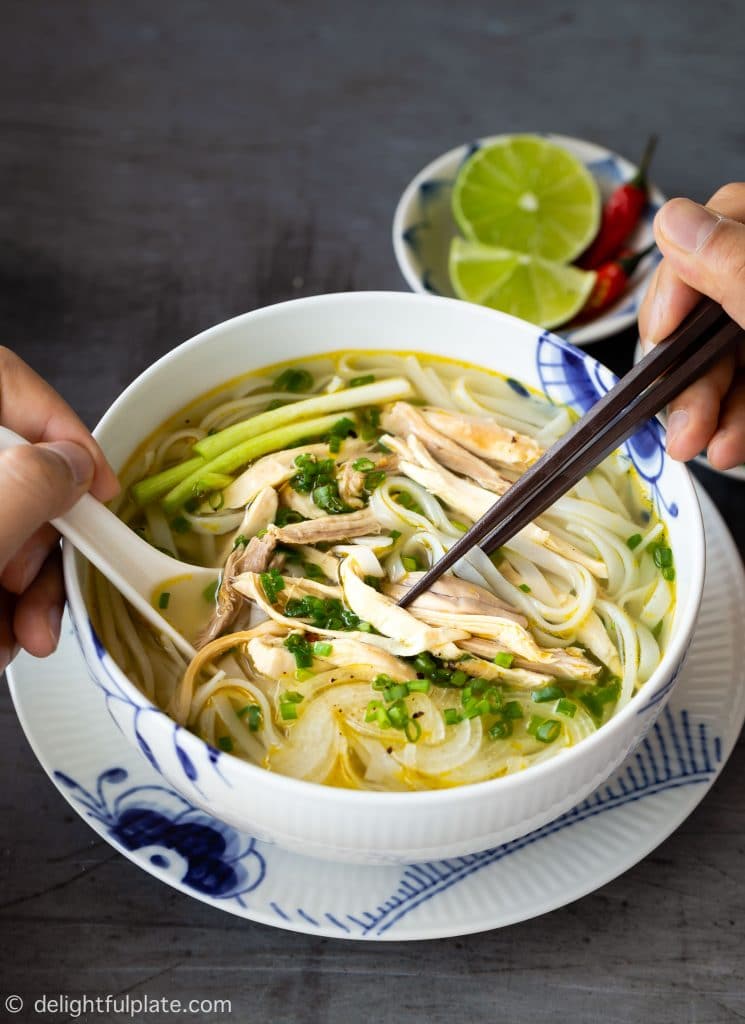
Ingredients
To cook pho ga, you will need a whole chicken or a combination of chicken thighs, breasts and chicken parts with bones (such as chicken backs and necks).
You will also need shallots (or onions), ginger and spices for the broth. I find that pho broth in Vietnam has a more pronounced ginger fragrance than Americanized pho. So be generous with the amount of ginger.
If you find your broth too bland, chances are you either did not use enough chicken bones, did not simmer long enough, or added too much water. I personally think there is no need to add rock sugar which artificially sweetens the broth, but I’ll leave it up to your taste to decide.
I also don’t like adding an apple to the broth like a lot of recipes do. It makes the broth taste totally weird and not like chicken pho broth at all, in my opinion.
Since chicken flavor is so light and delicate, I find that it is better to use shallots than onions. Onions are more pungent and sulfuric than shallots.
If you cook pho ga on your stovetop, it’s fine to use onions if you don’t have shallots. However, if you want to cook it in your pressure cooker, please use shallots. From my experiments with my pressure cooker, onions make the chicken broth taste somewhat unpleasant with its strong sulfuric fragrance.
My favorite spice blend for chicken pho broth consists of cassia bark (or cinnamon stick), star anise, coriander seed, and black cardamom pod. Black cardamom pod adds a lovely sweet note, but you can skip it if you cannot find it. If the bunch of cilantro you have on hand has cilantro roots, wash a few of them and simmer with the broth instead of using coriander seeds.
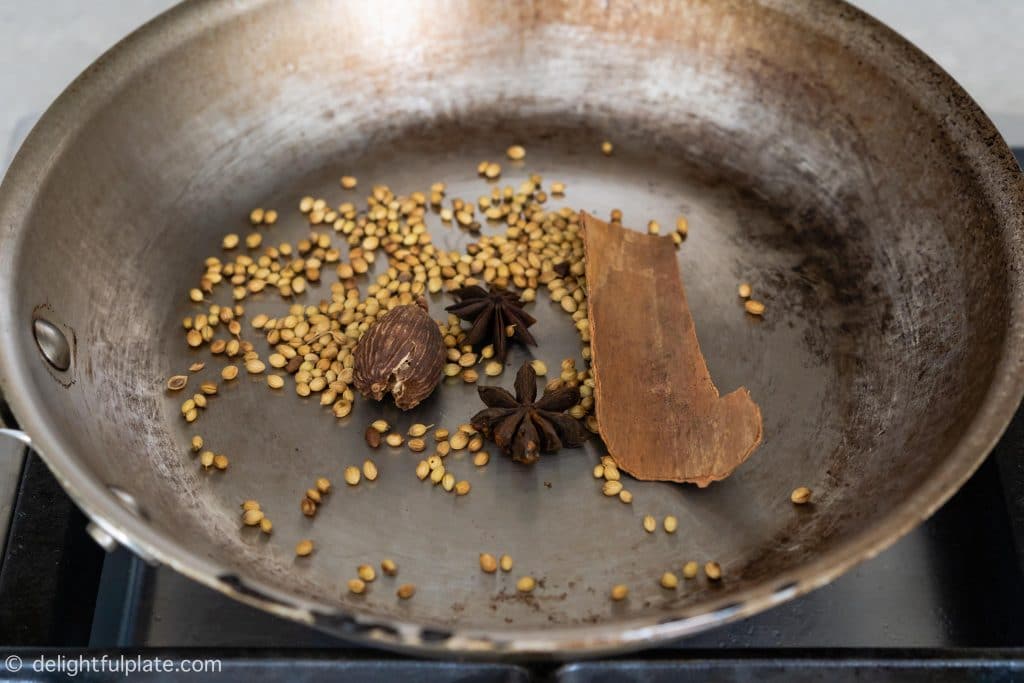
I also tried cloves and found that with cloves, it’s important to use a very small amount, like 3-4 cloves per one whole chicken and don’t simmer cloves in the broth too long. I only add cloves during the last 20-30 minutes. The spice blend with cloves is actually closer to the taste of pho ga Hanoi than with coriander seeds.
I don’t recommend adding fennel seeds as they gave the chicken broth some kind of a herbal taste I wasn’t fond of, but feel free to play around with the spices.
The broth is flavored with some fish sauce. Make sure you add fish sauce at the very end. Don’t add it in the simmering stage because it can result in some sourness in the broth.
Essential Steps
Whether you decide to cook pho ga on the stovetop or in a pressure cooker, I strongly recommend parboiling the chicken first to get rid of impurities and unpleasant chicken smell.
One more extra step you can do is to toast the spices and dry roast the ginger and shallots to give the broth more depths. However, this step is not as critical as blanching the chicken.
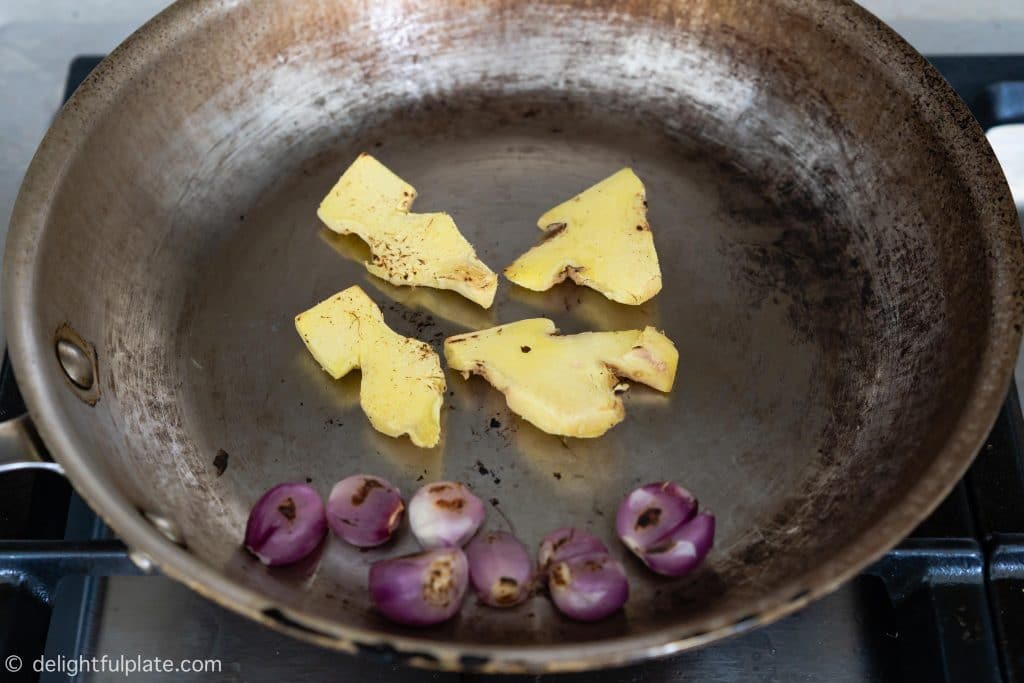
Stovetop Method
I personally think stovetop is the best method to cook any kind of pho noodle soups. Slow and gentle simmering is what makes the magic happen.
First, you should simmer the chicken with ginger, shallots, and spices until the chicken is just cooked through. Do not overcook or the meat will not have a good texture.
Then separate the chicken meat from chicken bones and add the bones back to the broth. Continue to simmer for, ideally, 45-60 minutes at least or until the flavors are concentrated to your likings. If you have time, you can even simmer up to 90 minutes.
Pressure Cooker Method
I understand that the point of using a pressure cooker such as an Instant Pot is to cut down on cooking time, but we shouldn’t sacrifice the taste too much. Therefore, I strongly recommend doing pressure cooking in two stages.
The first stage needs only about 3 minutes of pressure cooking to get the chicken fully cooked. Then we separate the meat from the bones and continue to pressure cook the broth with just the bones. If we don’t stop in the middle to get the chicken meat out, it will be overcooked.
To be honest, for me, in order for the pressure cooker chicken pho to turn out as good as stovetop chicken pho, the amount of time I save is not very significant.
How to Serve
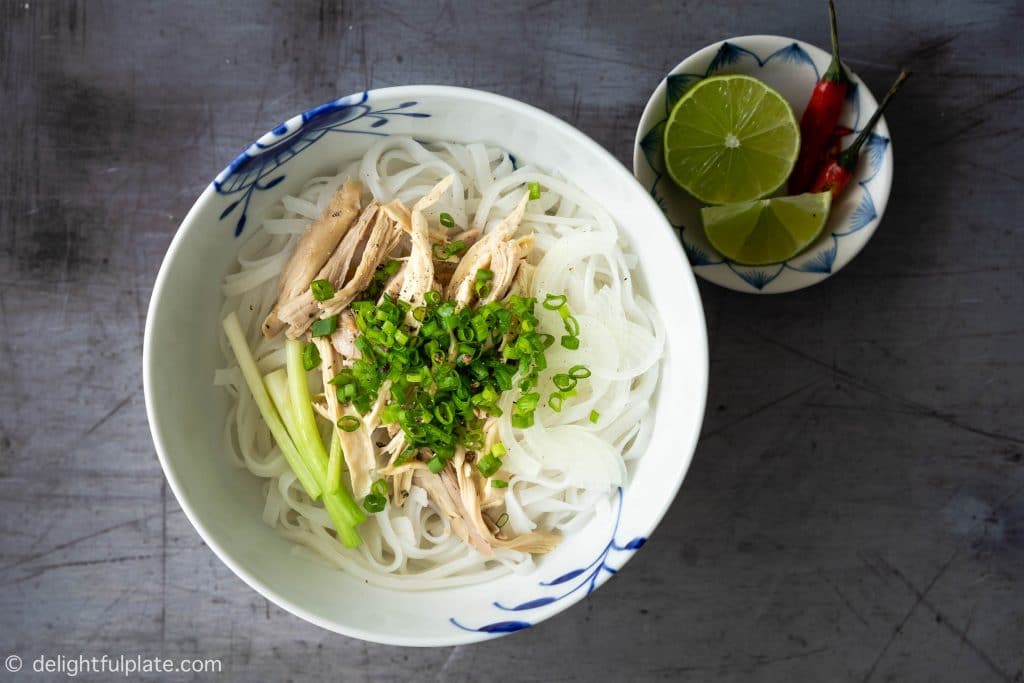
People in Hanoi (and Northerners in general) serve pho ga plain and simple. We top the noodles with chicken meat, very thin slices of onions (I mean paper-thin), a good sprinkle of black pepper, scallions, and sometimes cilantro or julienned kaffir lime leaves.
You may also add a few slices of birds-eye chili if you want some heat or add a squeeze of lime to your bowl when eating at the table.
For scallions, separate the white and green parts. Thinly slice the green parts and add them to the bowl. With the white parts, quickly poach them in the boiling broth before adding them to your bowl. Finally, ladle the hot broth over everything and serve immediately.
If you want to serve it in Southern style, you will also need some bean sprouts and more fresh herbs (like Thai basil – húng quế and sawtooth leaves – ngò gai) on the side. Detailed measurements and instructions are in the recipe card below as usual.
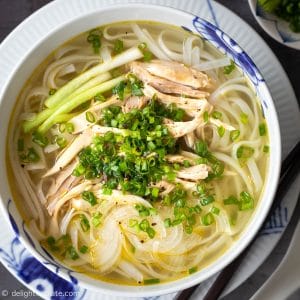
Authentic Pho Ga (Vietnamese Chicken Noodle Soup)
Ingredients
- 1 whole chicken (about 3-3.5 lbs)
- 3 thumb-sized pieces of ginger, peeled and sliced in half vertically
- 5 large shallots, peeled
- 1 small piece of cassia bark, or 1 cinnamon stick
- 2-3 star anises
- 1 tablespoon coriander seeds (or 3-4 cloves, please see Notes if using cloves)
- 1 black cardamom pods, cracked open
- 2 teaspoons salt (plus more to parboil the chicken)
- 2-3 tablespoons fish sauce
- 9 cups water
- pho rice noodles
To serve
- scallions
- half an onion, sliced very thinly
- freshly cracked black pepper
- birds-eye chili pepper, sliced
- lime wedges
Instructions
Prepping steps
- Add boiling water to a pot large enough to fit in the chicken. Add a pinch of salt and chicken to the pot. Let it boil for a minute, then remove the chicken and discard the liquid.
- In a pan over medium heat, dry roast the ginger and shallots until fragrant and lightly develop colors. Set ginger and shallots aside.
- Reduce the heat to medium low. Add cassia bark/cinnamon, star anises, coriander seeds and black cardamom pod (if using) and toast just until fragrant. Be careful not to let them burn. Put spices in a spice pouch.
Stovetop Method
- In a clean pot, add chicken, ginger, shallots, spice pouch, 2 teaspoons of salt and 9 cups of water. When it starts to boil, skim off any foams and lower heat to a gentle simmer.
- Cover and simmer for 15-20 minutes or until the chicken is just cooked through. You can test by using a meat thermometer, or inserting a chopstick and see if the juice runs clear. Remove the chicken from the stock pot.
- Put the chicken in an ice bath to stop the cooking. Then take it out of the ice bath, separate the meat from the bones. Add the bones back to the pot. Continue to simmer the broth for at least 45-60 minutes, or more until flavors are concentrated to your liking.
- Before serving, taste the broth and flavor with 2-3 tablespoons of fish sauce to taste.
Pressure Cooker Method
- Add 1 piece of ginger and half the shallots with the chicken to your pressure cooker. Add 2 teaspoons of salt and 6 cups of water. Close the lid and valve, pressure cook on High for 3-4 minutes (depending on the size of the chicken).
- Slowly release the pressure manually. Remove the chicken from the pressure cooker, put it in an ice bath to stop the cooking. Then take it out of the ice bath, separate the meat from the bones. Add the bones back to the pressure cooker.
- Add the remaining ginger, shallots and the spice pouch to the pressure cooker. Pressure cook on High for 20-30 minutes (the longer the better), and let it release pressure naturally.
- Once pressure cooking is over, taste the broth and see if you can add some more boiling water without diluting the flavors. Before serving, flavor with fish sauce to taste.
Putting together
- While the broth is cooking, shred or slice the chicken into bite-sized pieces. Prepare pho rice noodles according to package instructions.
- Separate the white and green parts of the scallions. Thinly slice the green parts while quickly poach the white parts in the broth. Also slice the onion very thinly.
- Add pho rice noodles to serving bowls, top with chicken meat, scallions and thinly sliced onions. Top with freshly cracked pepper. Bring the broth back to a boil and then ladle broth into serving bowls.
- Serve immediately with birds-eye chili and lime wedges on the side.
Notes
Nutrition
I’d love to hear what you think about the dish, so please feel free to leave a comment. New recipes are added every week so let’s connect on Facebook, Pinterest and Instagram for the latest updates. You can find my collection of Vietnamese recipes here.



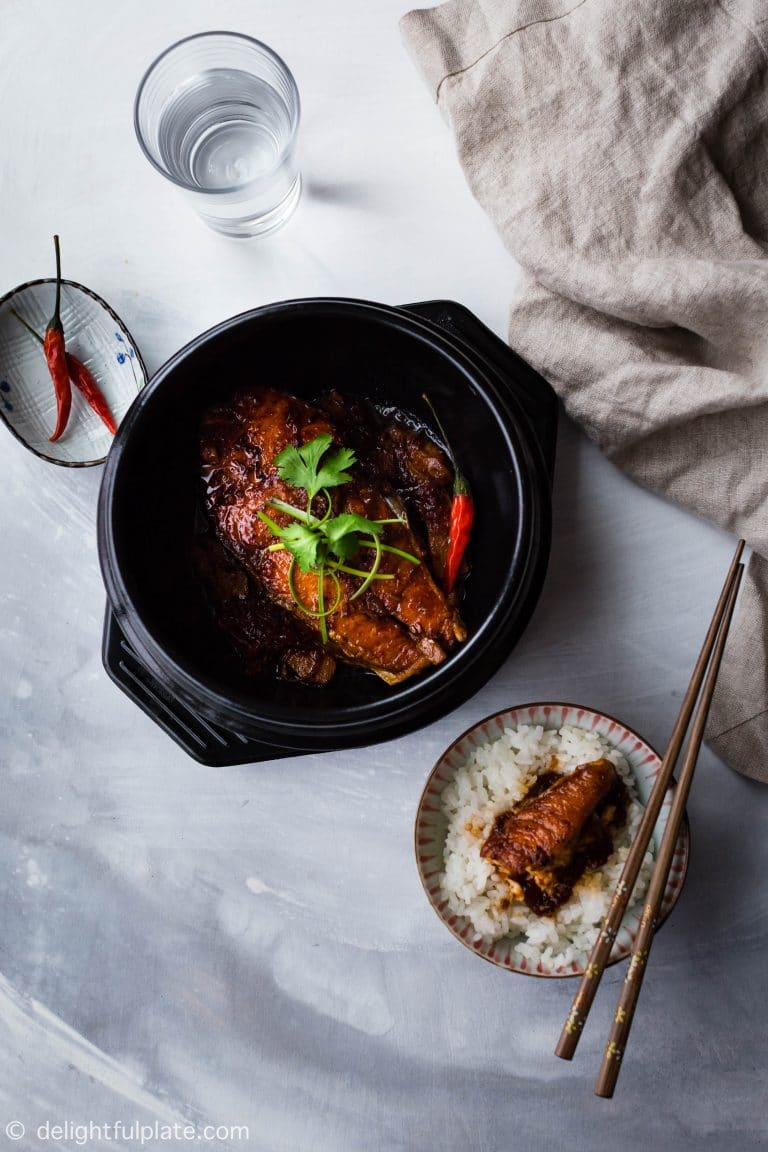
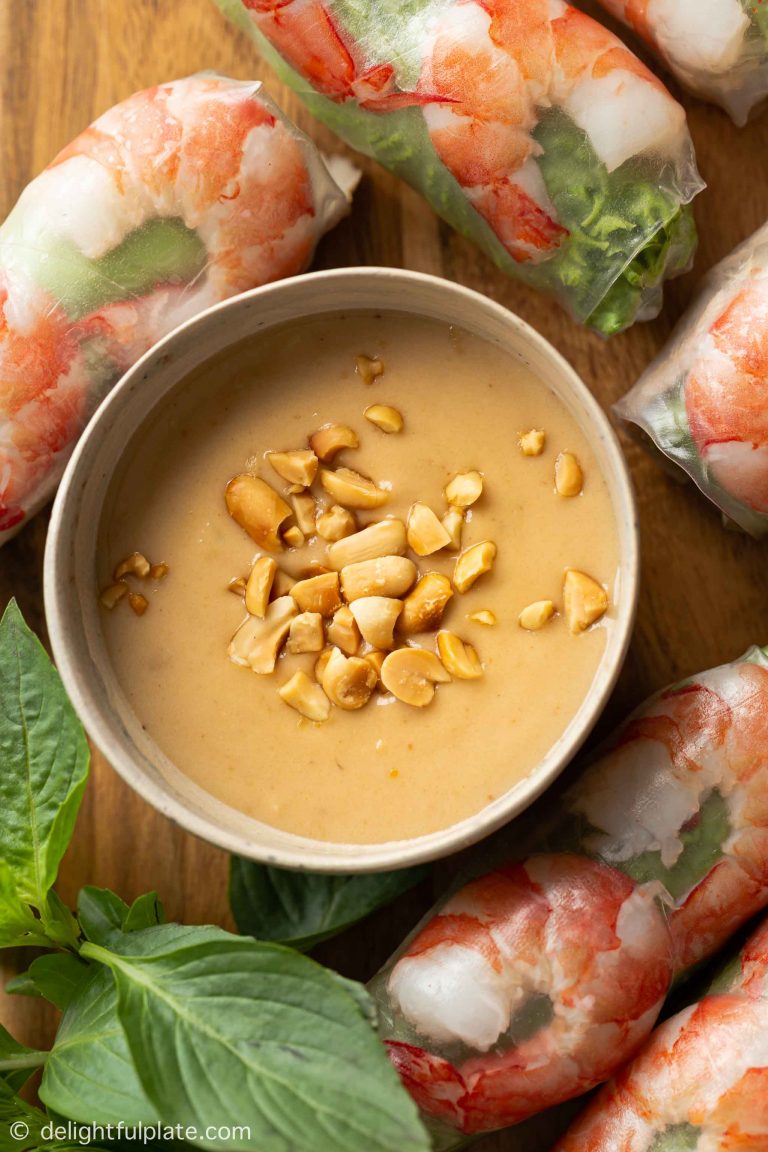


I made this soup tonight American style. I used the veggies I had on hand. I cooked the onions in olive oil and garlic, added halved Brussel sprouts, bell peppers, shishito peppers, broccoli, and followed the recipe. It was delicious. The spices make it!!
Hi Kathy,
Thank you for sharing how you created your version of the soup with available veggies! I’m glad you liked how it turned out.
This broth with the combination of spices was absolutely flavorful and so tasty before I added the fish sauce. I didn’t have a spice pouch but simply straining the broth after cooking worked for me. I will surely make this again.
YUM! Next time I’ll need to make this with a free range chicken–the best method in getting the real chicken flavor in my opinion. Nonetheless the taste is pretty close to Turtle Tower’s in SF, which specializes in Northern style Pho Ga. Thanks for sharing!
Thank you for taking the time to write the feedback! I’m so glad to read it. Yes, I agree that higher quality chicken will produce better chicken flavor. I often got chicken from the local farmers’ market. Otherwise, you can also add some more chicken necks, bones or wings for a stronger taste.
Aloha from Hawai’i! We love pho in the islands and saw your recipe and wanted to try and make it at home. It looks delicious. Could I use ground cardamom instead of the pods?
Hi Brandy,
I haven’t tried ground cardamom instead of the pods so I can’t say with certainty. When my sister couldn’t find whole black cardamom pods in Denmark, she used 2-3 green cardamom pods and I still enjoyed the soup a lot. I also think if you can’t find the pods, you should be fine with just cinnamon, star anise, coriander seeds and 1-2 cloves. If you give it a try, let me know how it goes.
I loved this!!! we made the broth last night then reheated in a big pot and had it for breakfast. the broth tasted so clean and delicious, the chicken was tender and the fresh pho noodles i bought were perfect, really such a difference from the dry ones. the only thing i messed up was making too many noodles, they got mushy and stuck together in the pot after i drained them. next time i’ll make sure to only make the amount of noodles i plan to eat right away. anyways definirely a five star recipe, it tasted like restaurant quality from my favorite spots in Washigton
Hi Daniel,
Sorry I missed your comment (July 2021 was a really tough month here in Saigon). I’m very happy you enjoyed how it tasted. I grew up with chicken pho and beef pho as my regular breakfast. I also find the fresh noodles to be always much better than the dry ones. The dry ones seem unable to have the same softness as the fresh ones.